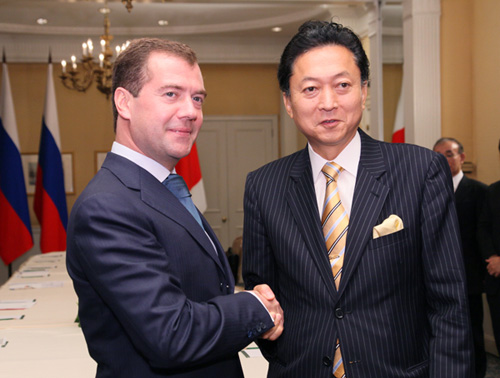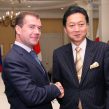
Japanese Prime Minister Hatoyama Meets President Medvedev in New York
Publication: Eurasia Daily Monitor Volume: 6 Issue: 183
By:

Japan’s Prime Minister Yukio Hatoyama, fresh from the resounding victory of his party in the Japanese Diet elections, traveled to New York in late September and met (among others) with Russian President Dmitry Medvedev on the sidelines of the U.N. General Assembly. At their meeting –brought about at Moscow’s request– Medvedev promised to use an “innovative approach” to the issue of resolving their territorial dispute over the Kuril Islands. When pressed by Hatoyama to clarify what this meant, Medvedev suggested that the two sides should be prepared to pursue “flexible measures.” While Medvedev focused on economic cooperation during the talks, Hatoyama reportedly stuck to the territorial issue, saying that the two issues (economics and territory) are like “two wheels of a cart” (Yomiuri Shimbun, September 25).
Despite the earnest gesture by Medvedev, one Japanese foreign ministry official brushed off any speculation that a territorial resolution is anywhere near. “Russia’s position on the territorial issue has not changed. We should not fluctuate between optimism and pessimism after hearing [Moscow’s] views” (Yomiuri Shimbun, September 25).
Hatoyama brings an interesting résumé to the table when it comes to Tokyo’s relations with Moscow. His grandfather, Ichiro Hatoyama, was prime minister when Japan normalized its relations with the Soviet Union in 1956 (although no peace treaty was signed). During the elder Hatoyama’s negotiations with the Soviets in Moscow, both sides agreed to a two-island solution. The United States, concerned about the implications of a Soviet-Japanese rapprochement at the time, forced Japan to renege on the deal. Since that time, the “1956 formula” has constituted the Russian negotiating position. Both Vladimir Putin and Medvedev have reiterated this two-island solution as Russia’s final position. Meanwhile, Yukio Hatoyama’s son is currently a graduate lecturer in Moscow, and works at Moscow’s Institute for Complex Strategic Studies where he is actively involved in a large engineering project (Russia Today, September 8). Hatoyama, the current prime minister, has insisted that Japan’s position of “four islands at once” constitutes Tokyo’s final position and that it will not change under his cabinet.
Nevertheless, Hatoyama has stated that he holds a keen interest in the positive development of Japanese-Russian relations. The former Prime Minister Taro Aso (Hatoyama’s predecessor) was criticized heavily in the Japanese press earlier this year when one of his advisors outlined a potential deal with Russia wherein Japan would receive fifty percent of the disputed territory (three of the islands, and one half of the territory of the fourth) (Izvestia, April 22). Hatoyama has insisted that the four islands remain the bottom line, but there are indications (and some angst among veteran Russia watchers in Japan) that Hatoyama will show more flexibility.
This line of thinking can be afforded some credibility given Hatoyama’s announcement that he is assigning former jailed lawmaker Muneo Suzuki to the post of chairman of the Diet’s foreign relations committee. Suzuki was jailed for one year in 2002 after being convicted of bid rigging for large construction projects in his own home district of Hokkaido, as well as for aid projects in Africa. Suzuki gained fame as Deputy Chief Cabinet Secretary for the Liberal Democratic Party (LDP) where he wielded enormous influence over Japan’s Russia policy in the late 1990’s and early 2000’s. Suzuki was known to favor a flexible policy toward Russia and was one of the authors of the “two-track” policy, which called for a reversion of the two islands along the lines of the 1956-formula, followed by negotiations over the two remaining islands. Critics of this policy were numerous and vociferous, and included former Prime Minister Koizumi. Suzuki was convicted after Koizumi became prime minister, and interestingly, the allegations included Suzuki’s role in the bidding for the construction of a community center on one of the disputed Kuril Islands.
Upon his release from detention, Suzuki was re-elected in 2005 in his old district as the sole candidate of the New Party Daichi. In the most recent elections he joined the coalition along with Hatoyama’s Democratic Party of Japan in defeating the LDP. In an interview after his appointment, Suzuki again raised the “two-track” formula in reference to Japan’s Russia policy. While insisting that he agrees with the need to recoup all four islands, he stated that the methods needed to be flexible, and that by merely insisting on “all four islands at once” Japan could not be successful in any negotiations (Sankei Shimbun, September 23).
Hatoyama expects to enlist Suzuki’s support in his well-publicized effort to loosen the stranglehold of the bureaucrats over the Japanese policy-making process. Suzuki will be expected to keep watch over the ministry of foreign affairs, where he made many enemies among diplomats working on Russia. It will be interesting to see whether Suzuki’s “two-track” formula will become a negotiating tactic for the Hatoyama cabinet as it attempts to revitalize Tokyo’s relations with Moscow.




